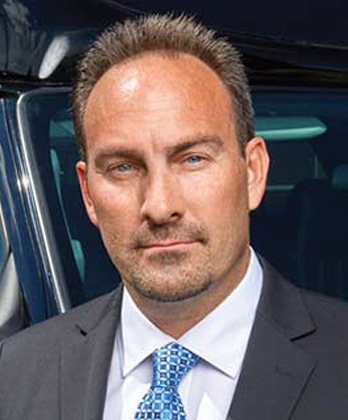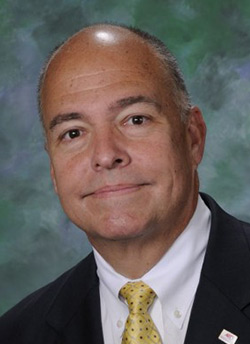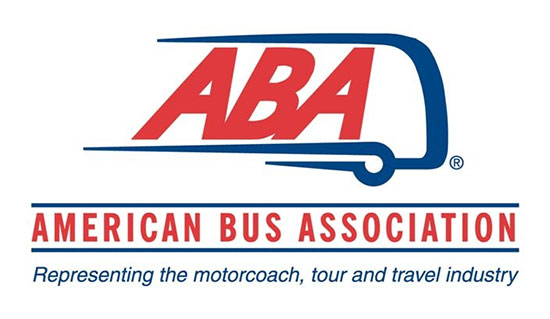- Details
- Category: Industry News
On July 9, Forest River Bus will deliver a free vehicle to the winner of their 100,000th Celebratory Bus Giveaway. Harmony Day Support, a nonprofit organization based in Forest, Va., was selected as the recipient of the bus this past September. Harmony Day Support services 80 adolescents and adults with intellectual and developmental disabilities.
 President of Forest River Bus Division David Wright
President of Forest River Bus Division David Wright
The Lynchburg News & Advance and several local news channels will be in attendance to report on the delivery, along with a ribbon cutting and celebration luncheon.
Forest River recognized that the building of their 100,000th vehicle was a momentous occasion, and the company chose to celebrate the event with a giveaway. Harmony Day was among more than 200 submissions reviewed by a committee of four individuals—two individuals from the local community and two from within the industry not associated with Forest River Bus.
In September, Forest River Bus President David Wright said, “We are excited and proud to announce Harmony Day Support, from Forest, Va., as our Forest River Bus recipient. We look forward to working with their team to produce a vehicle that will perfectly fit the needs of their staff and residents.”

“At Harmony, we place a strong value on creating a culture of safety, independence, personal growth, and community service through whole-person development,” said Harmony Day Support Executive Director Andy Coleman. “It is our goal to provide caring, personalized attention, and learning opportunities with a focus on social, academic, independent living, spiritual support, and employment preparation training.”
Forest River Bus, owned by Berkshire Hathaway, designs and builds its buses in Goshen and Elkhart, Ind. Forest River Bus has a rich history of manufacturing expertise and dedication to customer satisfaction, building small to midsize shuttle buses for both the public and private transportation markets.
Visit forestriverinc.com or harmonydaysupport.org for more information.
[06.22.20]
- Details
- Category: Industry News
As states begin to allow travel and lessen restrictions on COVID-19 lockdowns, the American Bus Association (ABA) has published suggested guidelines on how to prepare buses to once again receive and protect passengers. ABA convened a task force of members—including operators and vendors—a few months ago that helped the association to establish procedures for areas such as employee protections, cleaning and maintenance, emergency evacuation SOPs, and public relations.

The 20-page report, called The Motorcoach Industry’s Sample Policies for Post-Pandemic Cleanliness and Safety Protocols, is available at busesmoveamerica.com.
The protocols were released on the heels of a tough report from the ABA Foundation that estimates that the U.S. motorcoach industry will see its economic loss due to the virus reach nearly $11 billion, a 71 percent decline in annual business. This latest report is moderately better than the $11.1 billion previously predicted in April 2020.
 ABA President & CEO Peter Pantuso
ABA President & CEO Peter Pantuso
“While this is a slight improvement from the estimates developed at the height of the economic disaster, it represents just a 1.9 percent improvement,” said ABA President & CEO Peter Pantuso. “This data shows the continued decimation of the private motorcoach industry, which has not received any financial help from Congress or the Trump Administration like other modes of transportation received in legislative relief packages passed so far.”
With a challenging year ahead, ABA is calling on Congress for $10 billion in federal grants and $5 billion in loans to stabilize its members and ensure the commercial motorcoach remains a vital part of America’s transportation network. ABA is requesting assistance from the available funding already appropriated to the U.S. Treasury under the CARES Act and to be specifically included in future recovery packages the U.S. Congress and the Administration may consider.

The motorcoach and private bus industry provides nearly 600 million passenger trips annually, slightly less than U.S. commercial airlines. It is made up of more than 3,000 small family-owned and -operated businesses, many of them multigenerational. These companies provide essential travel services in every part of the country and have often been described as “America’s Strategic Transportation Reserve” as they serve the military and have stepped in to serve people in harm’s way of hurricanes and other natural disasters, and helped with passengers on airlines and Amtrak when these modes have broken down.
“If this industry does not receive government assistance immediately, I can’t say how much of it will be left when Americans need access to economical and reliable transportation for work or for leisure, or is in need emergency evacuation services as a result of m natural disasters,” said Pantuso. “As the economy tries to right itself, it is buses who will bring people to destinations, hotels, events, and other locations that are also seeking to recover.”
Visit buses.org for more information.
[06.22.20]
- Details
- Category: Industry News
On the surface, it seemed that the Small Business Administration (SBA) Paycheck Protection Program (PPP) offered business owners a quick and easy solution to keep their employees working, while securing some much-needed cash during this period of economic uncertainly. However, the intricacies of the loan, along with recent modifications to the program, have made the PPP much more complicated than many business owners initially perceived.

On June 16, the National Limousine Association (NLA) hosted a live and interactive webinar on Facebook to help operators with the intricacies of the PPP, particularly with changes enacted on the brand-new plan since it went into effect in April. According to NLA President Robert Alexander of RMA Worldwide, the goal of the session was to “provide some useful information that will make the changing guidance and PPP rules easier to follow.”
On the webinar, Alexander was joined by Bill Faeth of Limo University and Louie Perry and Bill Smith from Cornerstone Government Affairs, the NLA’s lobbying organization. The Cornerstone duo have been on the “cutting edge of regulations” with Smith, in particular, having extensive experience with SBA affairs.
The foursome took live questions from the more than 100 operators participating in the webinar. Initial questions addressed future PPP payouts, with Perry speculating that Congress will open up more money after the current summer recess. He theorized that money may be provided for untouched sectors, such as our own industry.

The majority of the Q&A dealt with the recent changes to the PPP loans, most notably the extension of the forgiveness period and the update in the 75/25 Full-Time Equivalency (FTE) rules to 60/40. Perry and Smith also elucidated on three safe harbors that allow loan forgiveness for operators who don’t meet the full FTE requirements.
Operators who were unable to “attend” the session or have any questions regarding PPP loans are encouraged to visit view a recording of the webinar on the NLA’s Facebook page. Since the PPP is new, and was virtually put into play in a matter of weeks at the beginning of the pandemic, there are intricacies and adjustments that operators will need to navigate that differ from many government programs that undergo months of proposals and revisions. It’s important that owners ask questions to their lenders and do their due diligence so that they remain in compliance to maximize loan forgiveness.
Visit limo.org for more information.
[06.19.20]

